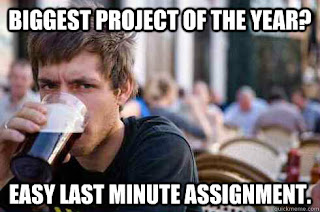(1) Positive Statement
What are you most proud of in your block presentation and/or your senior project? Why?
- The thing that I am most proud of is the fact that I had my audience engaged into my presentation by involving there thoughts and opinions. This allowed my audience to enjoy my topic and not fall asleep like most people would during these long presentations.
A. What assessment would you give yourself on your block presentation? Use the component contract to defend that assessment.
- I would honestly give myself an AE. I feel that I accomplished everything needed to receive a P and surpassed that because of the amount of props that I used as well as how I presented myself. I also engaged my audience throughout my presentation which kept them awake and happy.
- I would give myself an AE because of how much I was able to learn and uncover with my topic. I didn't just research these things I actually worked with companies that helped individuals receive free exam or glasses. I was finding advice and answers through the real world instead of the virtual.
- I feel that my activities worked very very well. They all worked with each other smoothly and efficiently to engage and educate my audience on my 3 answers. Everyone was excited and happy to move on to the next step to show off what great idea they have.
- At times I feel that I was repetitive when explain certain slides. If I could go back in time I would try to be smoother and funnier just to further engage my audience.
How has the senior project been helpful to you in your future endeavors? Be specific and use examples.
- This senior project has taught me how to become independent. I have been able to call and talk to people on my own to set up interviews or even finding a mentor. This project has also showed me how to manage time and schedules by allowing me to organize my mentorship hours. Research is also key because I can research things efficiently and correctly because of the amount of time I spent with my topic. This project has also opened my eyes on the social injustices around the world. Even if I can't do much to help I still try.











